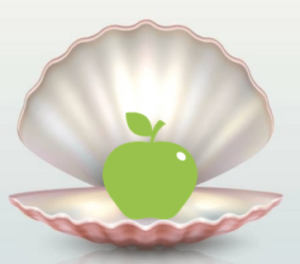 I have a pearl necklace that was once owned by my mother. I believe it is costume jewelry but it has this great rhinestone clasp and is probably from the 1940’s. I love this necklace because it belonged to my mother and because I love the look of pearls. They are lustrous, and have beautiful, soft colors and they are absolutely classic! Pearls are actually formed when certain mollusks collect an irritating foreign object. In response, the mollusk forms a protective coating around the irritant, continuing to form layers of aragonite or calcite minerals resulting in the gem.
I have a pearl necklace that was once owned by my mother. I believe it is costume jewelry but it has this great rhinestone clasp and is probably from the 1940’s. I love this necklace because it belonged to my mother and because I love the look of pearls. They are lustrous, and have beautiful, soft colors and they are absolutely classic! Pearls are actually formed when certain mollusks collect an irritating foreign object. In response, the mollusk forms a protective coating around the irritant, continuing to form layers of aragonite or calcite minerals resulting in the gem.
Equating this metaphor to students in our classrooms, we could easily say that they have formed protected coatings over irritants in their lives. These could include trauma, stress associated with family difficulties, or even trying to survive a pandemic. Children are resilient is the fallacy that is often reverberated when discussing these concerns. My question is, are children really resilient? Or is it because they are not yet able to identify, or articulate their thoughts, feelings, and emotions? Are they simply forming their protective coating that is carried with them, rearing its head as behavior issues, defiance, anger, or shutting down? Do we ever just try to listen, and understand?
Over the years, I learned how to help children clarify feelings, and emotions using a simple acknowledgement and a question: I see you are having a very big feeling. Can you tell me about that feeling? These two phrases are often enough to earn trust so that children will begin to talk about their emotions, and their response to those emotions. It is not always possible to determine the root of the issue because the irritant is already buried under so many protective layers. It is possible to help children identify emotions, the normalcy of such feelings, and how to discuss them without judgment or dismissal.
Children are our pearls, lustrous and colorful. They are gems that deserve appreciation and respect for who they are. Children look to us as facilitators, and guides to help them navigate the irritants of life. To do so, we must remove ourselves from our own experiences, our own emotions, to help build a trusting relationship that will help children see themselves as lustrous pearls.

